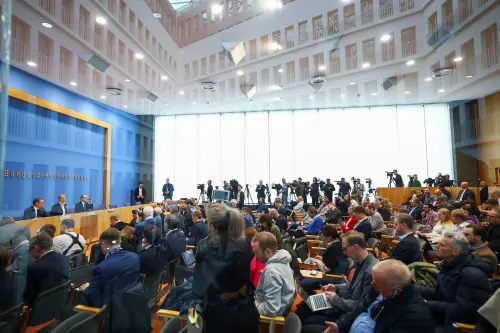Germany's conservative CDU/CSU bloc emerged as the leading party in Sunday's elections, potentially paving the way for a coalition government with the Social Democrats (SPD) and alleviating concerns in financial markets about the viability of a different three-party coalition.
Key German business leaders responded to the election outcome as follows:
RHEINMETALL CEO ARMIN PAPPERGER expressed confidence in the incoming government's ability to address challenges, stating, "The result provides a clear mandate to form a government. Germany will have a capable and determined government that will tackle the problems - I have no doubt about that."
SIEMENS CEO ROLAND BUSCH emphasized the need for immediate action, saying, "We don't need any further discussions, the problems are well known - we need implementation now."
E.ON CEO LEONHARD BIRNBAUM called for decisive measures to boost competitiveness and productivity through investments in education, innovation, and infrastructure, while stressing the importance of unleashing AI and digitalization.
THYSSENKRUPP CEO MIGUEL LOPEZ underscored the necessity of attracting investors and companies to unlock new growth potential, emphasizing the importance of transitioning to a greener economic system.
The GERMAN MECHANICAL ENGINEERING ASSOCIATION VDMA urged the new government to prioritize a strong economy, embrace technology, and foster close European cooperation.
SIEMENS ENERGY CEO CHRISTIAN BRUCH stressed the urgency of enhancing Germany's competitiveness, particularly in energy policy by expanding gas-fired power plants, strengthening wind energy, modernizing electricity grids, and ensuring a secure supply of raw materials.
DEUTSCHE BANK CEO CHRISTIAN SEWING called for swift and decisive action towards fundamental reforms to revitalize the economy, enhance growth, and maintain Germany's attractiveness for businesses and investors.
The GERMAN AUTO INDUSTRY ASSOCIATION VDA highlighted the necessity of a stable government to represent Germany effectively in Europe and drive domestic reforms to bolster the competitiveness of the automotive industry and overall business environment.
BDI INDUSTRY ASSOCIATION PRESIDENT PETER LEIBINGER emphasized the need for structural reforms, pro-growth decisions, and relief measures to reduce bureaucracy, simplify approval procedures, and foster innovation and growth in the long term.
